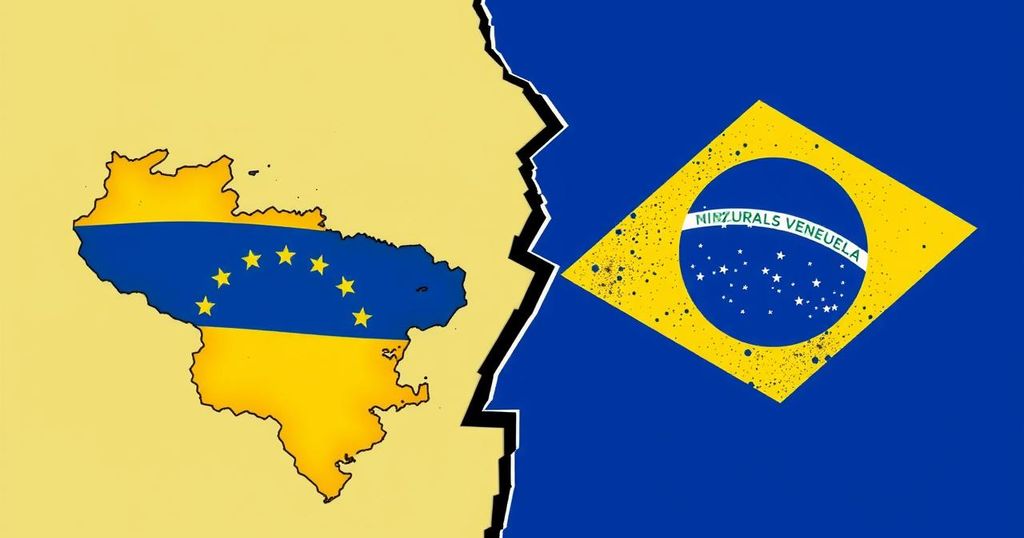The recent BRICS summit unveiled escalating tensions between Brazil and Venezuela after Brazil vetoed Venezuela’s entry as a partner state, amidst contested electoral legitimacy for President Nicolás Maduro. This action stems from strained relations post-elections and has drawn strong condemnation from Caracas, which views the veto as a hostile act against its sovereignty.
The recent BRICS summit in Kazan, Russia, has intensified diplomatic tensions between Brazil and Venezuela due to Brazil’s veto of Venezuela’s entry into the bloc as a partner state. This decision follows a series of strained relations resulting from the controversial re-election of President Nicolás Maduro in Venezuela. The administration of President Luiz Inácio Lula da Silva of Brazil refrained from providing a public justification for this veto and did not offer an explanation during the ministerial delegation led by Foreign Minister Mauro Vieira, who replaced Lula after the latter suffered a domestic accident. Venezuela has reacted strongly, labeling the veto as a “stab in the back,” asserting it reflects Brazil’s interference in its local politics. Diplomats involved in the discussions assert that the state of relations influenced Lula’s decision, particularly in light of Maduro’s contested electoral results. Brazil’s Foreign Ministry expressed its trust in Venezuela’s electoral process while seeking clarity on the election results, which remain undisclosed three months post-election. Caracas responded by emphasizing the importance of sovereignty and expressing dissatisfaction with Brazil’s actions, which they regarded as further sanctions against Maduro’s government. Venezuela has also criticized Brazilian diplomat Eduardo Paes Saboia for perpetuating the exclusionary policies established during former President Jair Bolsonaro’s administration. Maduro used a recent television address to challenge the Brazilian Foreign Minister regarding the veto, mentioning Saboia’s supposed pledge not to obstruct Venezuela’s integration into BRICS. The possible rift is further exemplified by contrasting perspectives on Brazil’s diplomatic stance; while Brazil views its actions as consistent with its commitment to international integration, Venezuelan analysts argue that Lula’s government has deviated from its earlier progressive and inclusive policies. The dynamics between the two nations now hinge on Venezuela’s next moves and Brazil’s approaches in the coming months. Despite fears of extreme reactions from Caracas, such as diplomatic expulsion, both sides aim to preserve dialogue and explore potential reconciliation regarding Venezuela’s BRICS membership aspirations.
The diplomatic relationship between Brazil and Venezuela has historically been complicated, particularly under the divergent leadership of the past few administrations. The BRICS summit, which includes major emerging economies, has recently been a focal point of contention due to Brazil’s refusal to allow Venezuela to join the organization as a partner state. This veto adds to ongoing tensions stemming from the electoral legitimacy of Nicolás Maduro, whose presidency has faced both national and international scrutiny. As members of the BRICS also navigate their energy policies, Venezuela’s vast oil reserves represent a significant potential asset that the bloc could leverage for greater influence in global energy markets. Understanding this backdrop is crucial in interpreting the complexities of Venezuelan and Brazilian interactions and the broader implications for Latin American regional relations.
In summary, the veto of Venezuela’s entry into BRICS by Brazil has underscored existing diplomatic tensions and raised questions about the future of bilateral relations. As both nations navigate their respective political landscapes and international standings, the potential for renewed dialogue and Venezuela’s integration into BRICS remains uncertain. This moment is critical for Brazil, as its decisions may shape not only its own foreign policy trajectory but also the dynamics of regional power within Latin America. Ultimately, the outcome will depend on subsequent diplomatic efforts and willingness to engage in constructive dialogue rather than punitive measures.
Original Source: www.brasildefato.com.br






